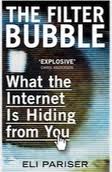On the face of it, the internet, search engines, and Google in particular have been a great boon to writers and others who do research as a necessary part of their work. Indeed, who would deny it? Remember the old days when you camped yourself in the library for hours on end, leafing through books that often delivered scant reward – insufficient or out-of-date information – or fiddled with spools of microfiche for that elusive news article? No question, we should be duly grateful for the luxury of sitting at home (before the same machine that we use to set down our work) with the ability to trawl the world’s resources rapidly and at no great expense. But are we being allowed to make the most of this wonderful opportunity?
If, like me, you had assumed Google’s sophisticated page rank algorithm was offering you the best, most authoritative, most useful selection from the vast sources of information it holds, then you need to be aware of the corrective presented in Eli Pariser’s new book The Filter Bubble. The nub of Pariser’s argument is that Google, far from facilitating an expansion of our world view in proportion to the expansion of available resources, is in fact limiting us by dint of our previous choices. We are being drip-fed indoctrination by our own ideas.
Pariser has upended my assumption that the spread of results I’d get from typing a query into my Google search box would be exactly the same as... yours, for example, provided we both entered the same search terms. Not so. Apparently Google uses 57 signals – ranging from where the browser is located to what items one has searched for before – to decide what site-links it is going to offer a particular user. The process is concentric because the more we access the internet for everything from information gathering to purchasing the more Google gets to ‘know’ about us individually, and the more bounded each of us becomes by the range of options it presents that are in easy reach. It’s a systematic process of personalisation by which Google builds a theory of identity based on ‘you are what you click’.
As a profit-seeking organisation, Google is ultimately not in the business of providing us with the best information; it is in the business of delivering us to its advertisers, sponsors and funders – the ones who pay the piper. The most obvious example is the sponsored links that appear on the top of one’s results page. Perversely, I avoid these, but Google has much more subtle ways of using the data I have previously provided to get me to places based on its commercial imperatives rather than my intellectual curiosity or professional need. Because Google’s behaviour marketing is invisible, and because I’m generally unaware that my choices are being made for me in this way, I am off guard to a degree that I would not be if I was, say, reading a newspaper with a known political viewpoint, or speaking to a salesperson who I know has a vested interest in selling me her wares. Google can fool and flatter me into thinking I’m making the decision without such influences, and that makes me (and you) the greater fool.
Of course it’s not only Google doing it. Amazon, iTunes and many others are sirens of sycophancy, calling our names and casting out ‘recommendations’, drawing us through filters into a subterranean model of our world where increasingly what we see are distorted or caricatured versions of our own reflection inside a grotto of product.
As information-gatherers we may be grateful for a shortcut through the morass of available data. As consumers we may welcome some guidance to our purchases based on known preferences – it can save time and effort, and help us get to things we might want or didn’t otherwise know existed, though it also reduces the opportunity for serendipitous pleasures – but as Pariser argues, what might be good for consumers is not necessarily good for citizens.
Nor are we reaching out fully to the global promise of the internet, which has the potential of widening our horizons, stimulating creativity, and putting us in instant touch with treasures of learning previously unobtainable. Pariser’s frustration with the way centralised entities have lassoed this promise is evident and well articulated in his thought-provoking book. His disappointment must be shared by all internet idealists who believed that information could be freed by the new technology, only to learn that it has merely been transferred to savvy opportunists who, appreciating the old adage that information is power, have steadily, almost invisibly, salted it away for redistribution on their own terms.

No comments:
Post a Comment